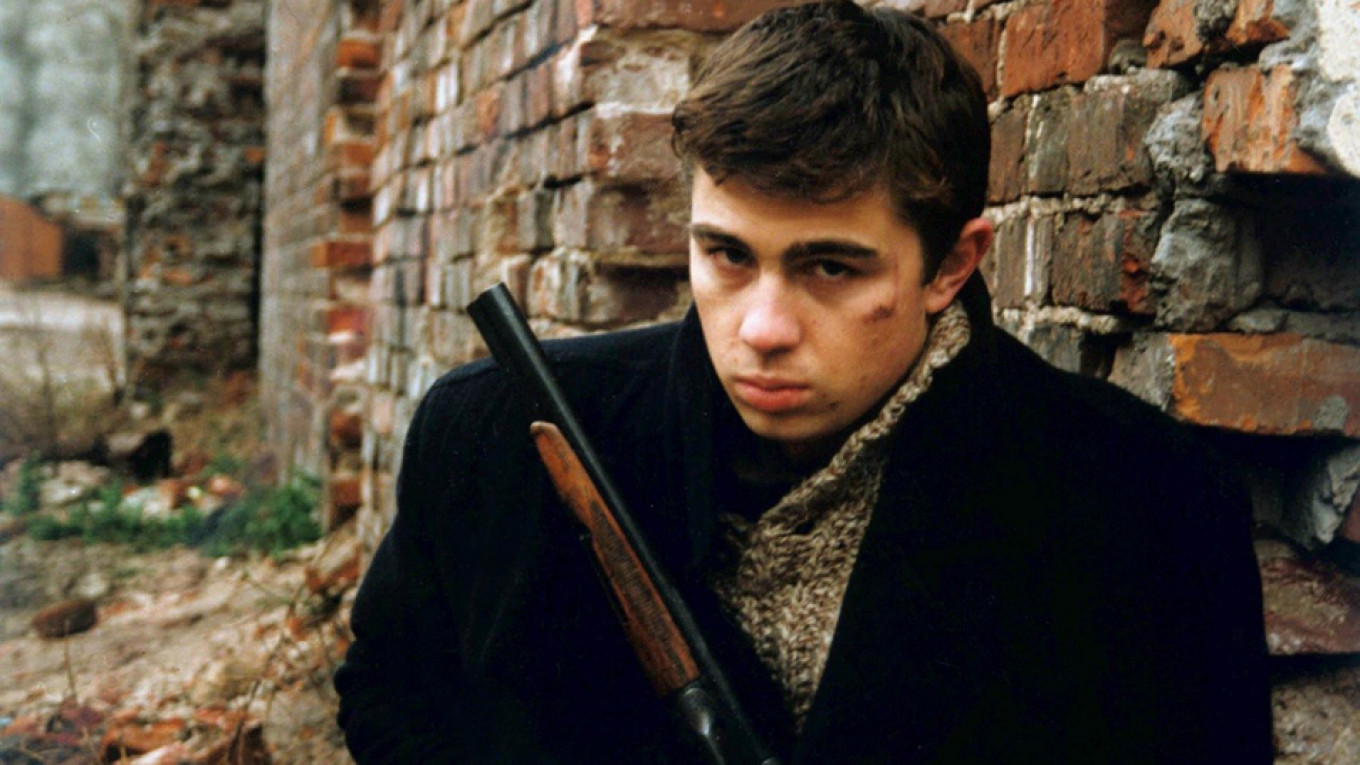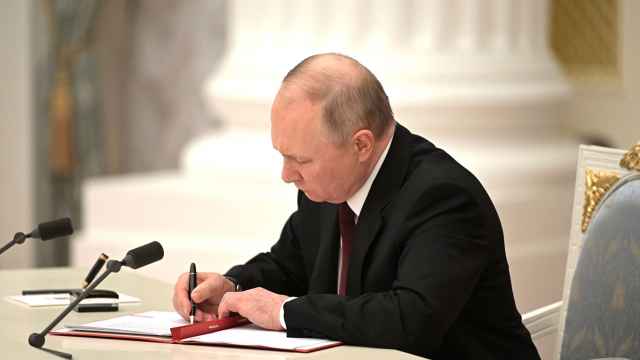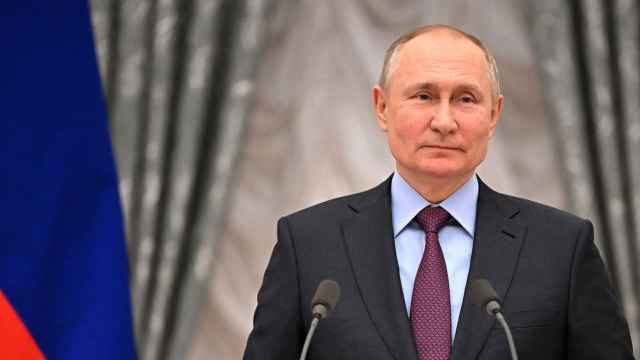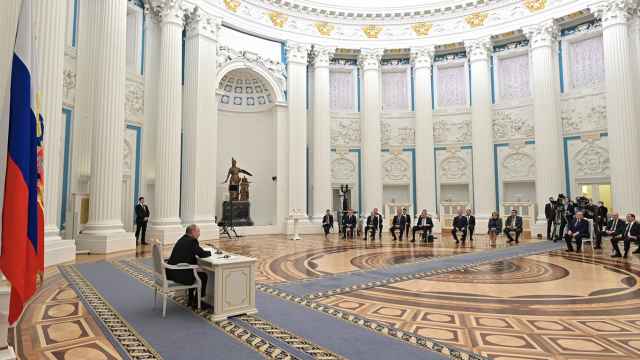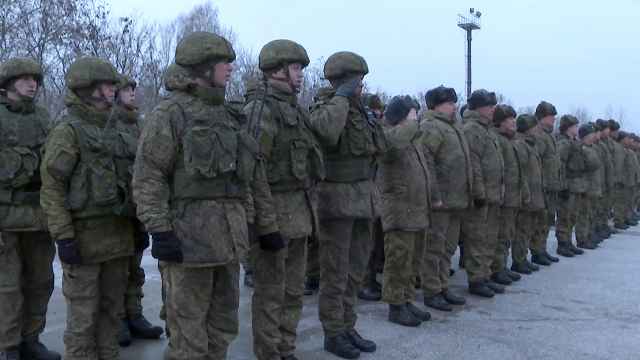Today’s independent Russia is a country that has risen anew. It has been obliged to solve, practically from scratch, the question of its place in the world — what unites the people who inhabit it, what kind of relationship these people have with the state and what they expect from it.
In the 1990s, Russian society had lost its foundation of familiar social norms and values and appeared to be too confused to formulate an answer to these questions. The government, which was in a state of permanent crisis, was also completely incapable of dealing with them.
The new era in Russian history that began with the arrival of the new millennium has presented different answers to these questions — answers that have come from both above and below.
The movie hero who defined an era
The dramatic events that brought the 1990s to a close in Russia — the war between the oligarchs and the government, the August crisis of 1998, the beginning of the second Chechen war and the choice of a successor — were bookended by the release of two iconic movies by Alexei Balabanov. The “Brat” (“Brother”) movies focused on the main character, Danila Bagrov, an ex-conscript who gets involved in gang warfare in the St. Petersburg of the late 90s.
It appears today that the “Brat” films chimed with social expectations most accurately of all: The movies formulated what the Russian people wanted from their government, and in many respects predicted the course of the country’s development. Yeltsin had assigned entire academic groups to work on developing a new “national idea,” but in the end this was expressed in just a few laconic phrases uttered by Bagrov in the films.
The first “Brat” film (released in 1997) expressed a call for the restoration of justice in its most basic of forms: the defense of the weak and holding the shameless behavior of the powerful in check. The sequel, “Brat 2,” (released in 2000) defined the feeling of national degradation resulting from defeat in the Cold War and the destruction of the familiar way of life.
Audiences, disarmed by the charm of Sergey Bodrov, forgive his character the unscrupulousness of his methods. In exactly the same way, society in the early 2000s closed its eyes to the fact that the restoration of the rules of the game in the economy and media was accompanied by the forceful seizure of property, and that special operations against terrorists produced excessive numbers of civilian victims.
The gratuitous and random shooting on display in the film and the excessive use of force in Russian politics can be attributed to the extraordinary circumstances: People see this as the price they have to pay for the anticipated deliverance from chaos and the restoration of normality.
During Putin’s first term, the state did not try to impose its ideology, did not intrude into private life and created conditions for economic growth and new consumer opportunities.
Even a series of catastrophes and tragedies in the early 2000s (the Kursk submarine sinking, the Nord-Ost hostage crisis, Beslan hostage crisis) was unable to shake our confidence that life is going in the right direction. We’re on our way home.
Life imitating art
Gradually the ruling elite developed its own style and mannerisms, and this code of behavior turned out to be suspiciously akin to that of Danila Bagrov.
Anti-Americanism, thuggish rhetoric and nostalgia for the Soviet days, details that seemed grotesque in “Brat,” were the easiest for the elite to adopt.
All of these became normalized by the authorities, while the restoration of justice and a final return to “normal” life kept getting relegated to the future.
The political regime that took shape under Putin, whose legitimacy in many respects rested on the promise to not allow a return to the “wild 90s,” became in practice a hostage to the worldview and methods of that decade, in which financial prosperity depended on your proximity to the throne. The law was applied manually and power was ultimately always measured in money.
Danila, embroiled in a war with bandits, is incapable of finding his way in normal life. In the same way as Danilla, the new regime, a survivor of the emergencies of the early 2000s, began to generate new battles for itself: the Yukos affair, the muzzling of the press, the murder of Anna Politkovskaya.
Russian society, which had hoped for a strong and just leader, clearly did not sign up for this, but the Kremlin already began to live by its own logic, smoothing over the growing tension with sporting victories and aggressive foreign-policy rhetoric.
In the 2000s, the demand for stability was realized from below, thanks to a consumer, tourist and gastronomic boom.
The populations of the large cities got used to the idea that they should be living well, and addressed the same consumer demand to the state: In the eyes of the most westernized part of society, the state is just one of the services that should work effectively, create additional conveniences and be transparent to public scrutiny.
The modernization-oriented rhetoric of the Medvedev presidential era (2008-2012) supported these expectations, but once again postponed their implementation to an indeterminate future. In reality, citizens found themselves increasingly running into corrupt officials, arbitrary policing and courts that were administered from above.
The Kremlin’s continuing use of manual control to manage issues relating to power was a clear signal that this structure to life remained unchanged, and that the “normalization” postponed for the future had finally been withdrawn from the agenda.
A cloud of hopelessness hung over the middle class that grew up under Putin: Russian Facebook users increasingly discussed options for emigration.
This attack of collective depression resulted in the explosion of protests in the winter of 2011–2012 — after which stability and justice finally turned into rhetorical figures, useful only for ritual pronouncements on the president’s televised call-in show.
Ideology from above
From 2012 onward, the state no longer attempted to pluck a national idea from the air to respond to this unofficial social demand.
For the first time in the whole of post-Soviet history, the state devised an official quasi-ideology, which would become the basis for national identity: Russia is an exceptional country, built on a powerful government, patriotism, respect for religion and traditional family values. It is encircled (and will always be encircled) by a ring of enemies, who envy its natural wealth and moral values. Russia is also the country that defeated fascism and can repeat the feat if the situation arises.
This ideology was affirmed through a series of propaganda campaigns in which society mobilizes in the face of a constructed external threat: Art activists who mock Orthodox Christianity; gay “propaganda,” which undermines the foundations of the healthy family; foreigners, who take Russian children out of the country.
The culmination of this mobilizing impulse was the new “war with fascism” in Ukraine, which began to unfold on the country’s TV screens in 2014.
This new ideology is not only a quasi-ideology — it is also soft.
It does not demand genuine faith and enthusiasm: Ritual displays of loyalty are sufficient.
The ideology also has a limited radius of use: It can explain to a national guard officer why it is necessary to beat a teenager with a baton, or function as a support mechanism for the inhabitants of grim monotowns, who exist in a life devoid of prospects and find salvation from hopelessness in a feeling of belonging to a great, powerful country.
But this version of national identity completely fails to answer the demands from which the current power structure was once born — for justice, the observation of ethical norms, and for comprehensible and universal rules of the game.
The confrontation between public forces — that are demanding their rulers change (or allow themselves to be replaced) — and the Kremlin — which has no intention of doing either — could go on for a long time to come, and this struggle may begin to be seen as a Russian national characteristic.
Ideology from below
However, it is more interesting to look at something else: Those versions of patriotism and national identity that are being created today from below, independently of the state, and which could become unifying principles for society in the future.
Today, the new formulation of the national idea, which in the 90s was concentrated in “Brat,” finds itself spread throughout popular shows on YouTube, in recordings by the new generation of hip-hop artists and in the work of street artists. This is local patriotism: A feeling of belonging not to a sovereign abstraction, but to a specific place that needs to be treated with care, respect and attention.
This is a completely fresh approach toward the 1990s — not as a “wild” decade or as a “time of freedom,” but as a tragic and heroic era that formed us all.
This is a gradually learned skill of cooperation, of joint participation in actions of social significance, of joining forces with neighbors, colleagues and likeminded people for some kind of meaningful goal. This goal can be fighting against tree-felling in the park in front of your house, helping the nearest kindergarten or defending an unfairly detained classmate.
This new national idea includes a changing attitude to the tragedies of the past, a new version of memorial culture — one in which not only war heroes are worthy of collective memory and veneration, but also the victims of a criminal government and the ordinary people who have paid with their lives for its incompetence. This has been demonstrated by the growing support for the campaign to “return the names” of victims of Soviet political repression or the younger generation’s discovery of the Chernobyl catastrophe after the release of the HBO series.
Ultimately, we are seeing that the national inferiority complex that is characteristic of the older generations (and which, perhaps, informs much of Russian foreign policy) is becoming obsolete.
And it is this gap between the authorities and society that is perhaps the most heartening news at the end of the 2010s. This is a society that is ready to accept and make sense of its history and identity, without waiting for these principles to be handed down from above, a society that is capable of taking responsibility for its life instead of waiting for the state to solve its problems.
The Russian language version of this article was originally published by Vedomosti as part of the series that considers the social, political and economic transformation of Russia over the last 20 years under Putin's rule. Read also:
20 Years of Vladimir Putin: The Transformation of the Economy
20 Years of Vladimir Putin: The Rise and Decline of a Regime
A Message from The Moscow Times:
Dear readers,
We are facing unprecedented challenges. Russia's Prosecutor General's Office has designated The Moscow Times as an "undesirable" organization, criminalizing our work and putting our staff at risk of prosecution. This follows our earlier unjust labeling as a "foreign agent."
These actions are direct attempts to silence independent journalism in Russia. The authorities claim our work "discredits the decisions of the Russian leadership." We see things differently: we strive to provide accurate, unbiased reporting on Russia.
We, the journalists of The Moscow Times, refuse to be silenced. But to continue our work, we need your help.
Your support, no matter how small, makes a world of difference. If you can, please support us monthly starting from just $2. It's quick to set up, and every contribution makes a significant impact.
By supporting The Moscow Times, you're defending open, independent journalism in the face of repression. Thank you for standing with us.
Remind me later.



